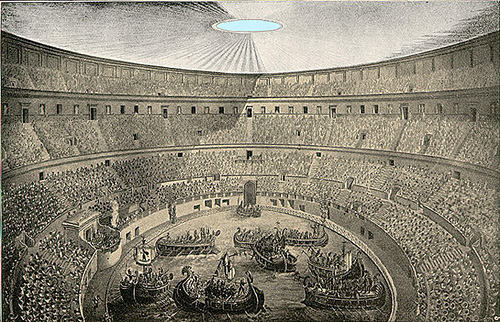naumachia

A naumachia was a naval battle artificially staged for public entertainment; these could be held on lakes or in amphitheaters like the Colosseum whose arena were capable of being flooded. Originally naumachiae were displays of seamanship, but in the imperial period they were increasingly used as ingenious ways to execute large numbers of criminals or prisoners of war. According to the historian Tacitus, Claudius staged a naumachia on the Fucrine Lake in 52 CE that involved 19,000 prisoners; those who survived the battle were subsequently pardoned because of their bravery. Dio Cassius relates that during the munera sponsored by Titus in 80 CE to celebrate the completion of the Colosseum, he surprised and delighted the audience by having water suddenly pour into the arena during a display of animals, which had all been taught to swim. After the arena was filled with water, there was an elaborate naumachia such as the one pictured in this reconstruction drawing.
Modern scholars dispute whether such staged sea-battles could actually have taken place in the Colosseum. It is possible that the elaborate substructures (the hypogeum) were not added to the Colosseum until the reign of Domitian, so that the arena could have been flooded for Titus's inaugural games; however, it is also possible that Titus held his naumachiae elsewhere. In any case, we hear of no naumachiae in the Colosseum after Domitian, so this form of entertainment was certainly not common in the Flavian amphitheater.

